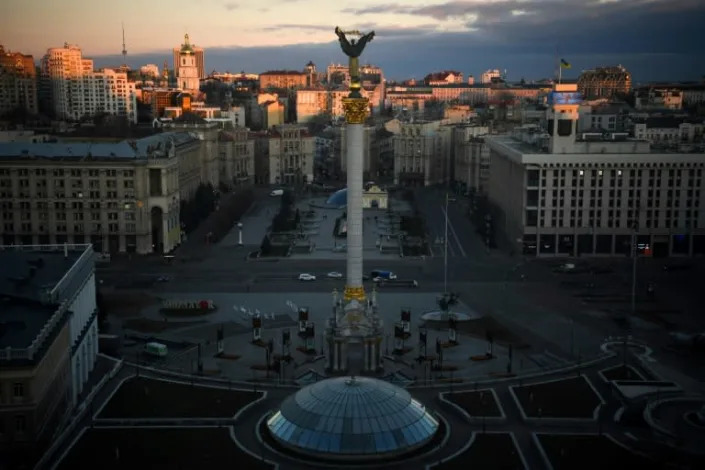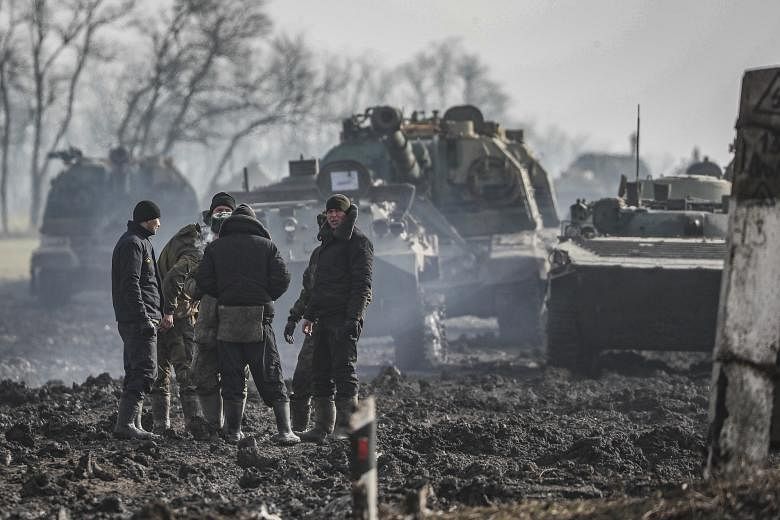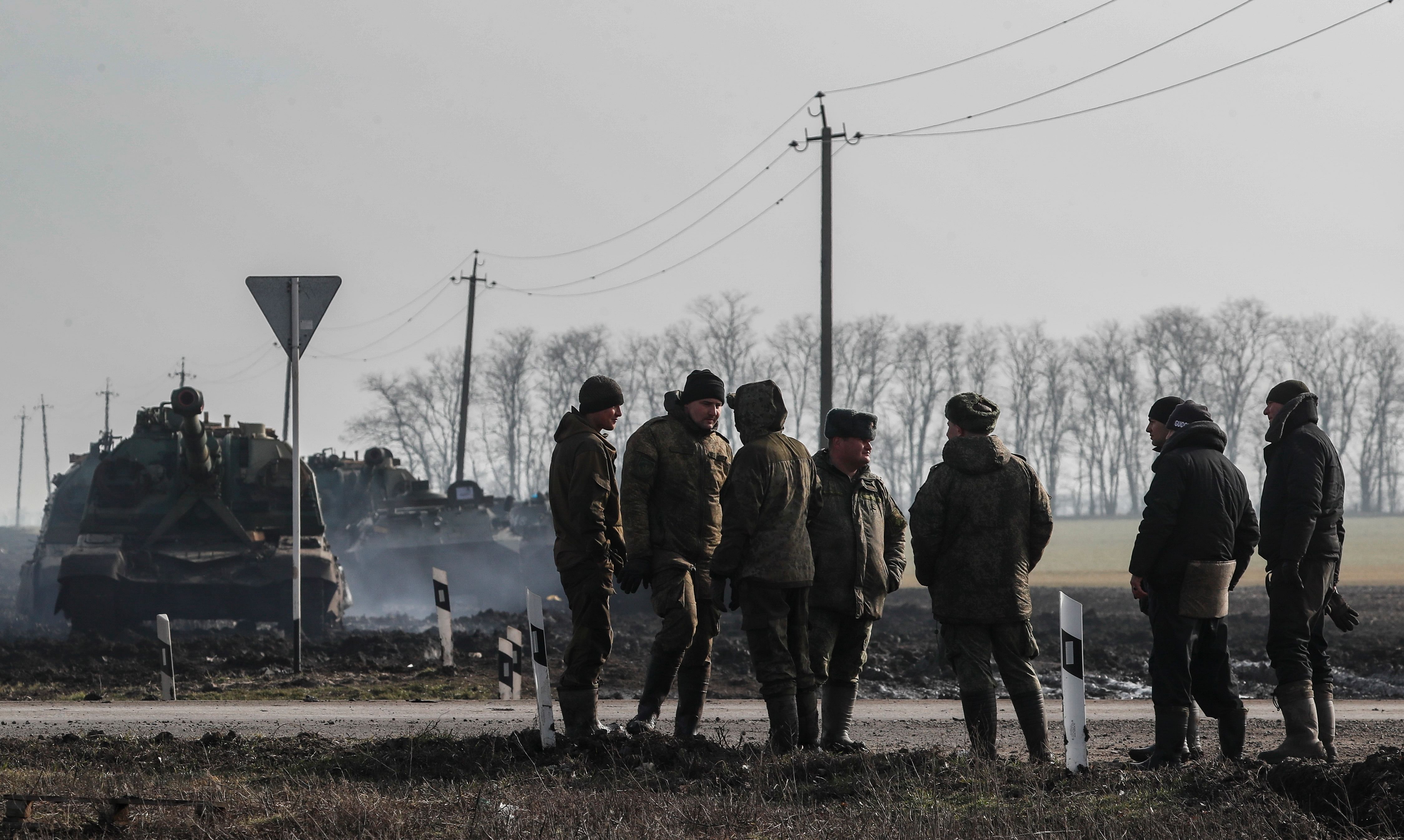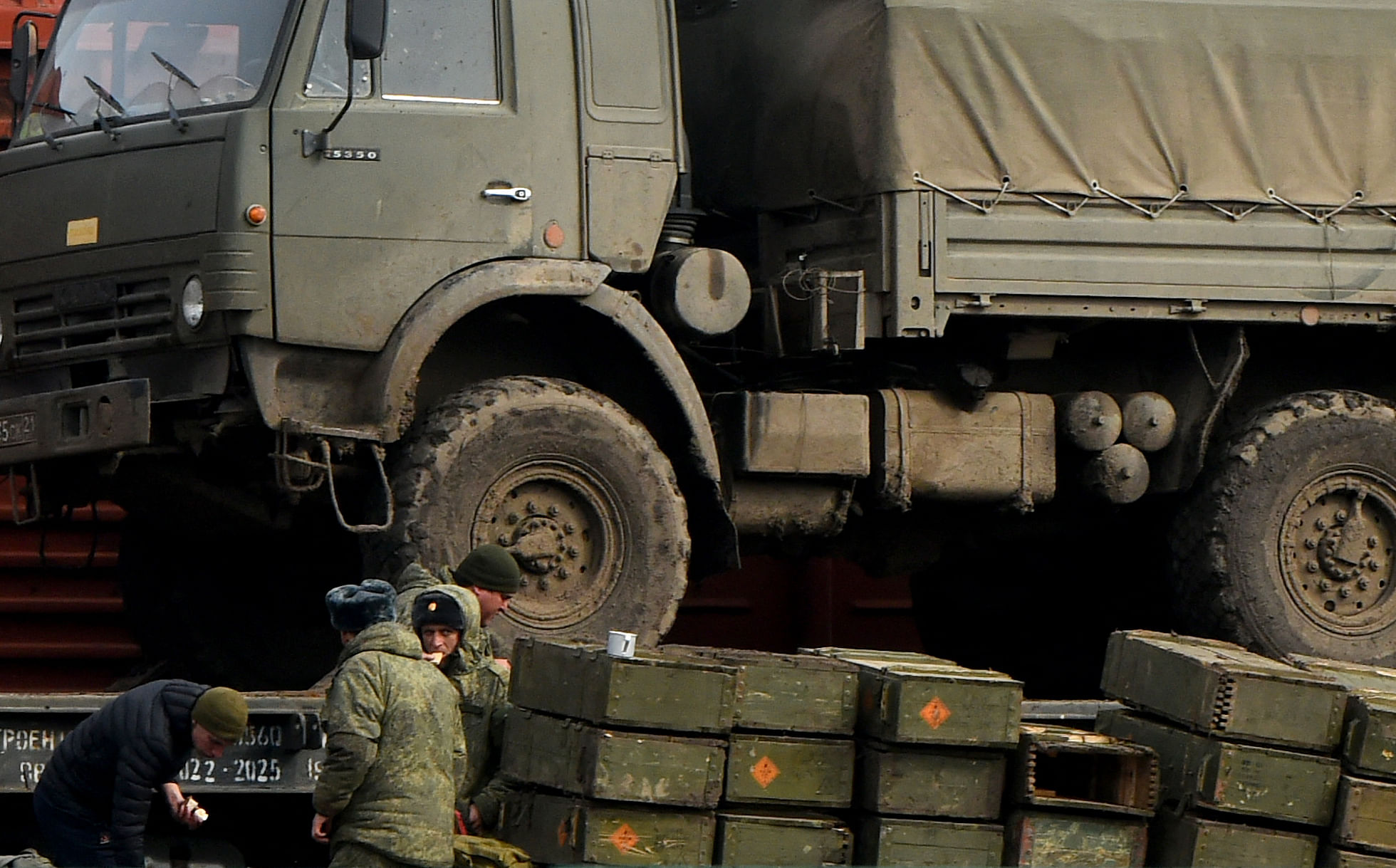Disbelieving but fretful, Kyiv hears nearing drumbeats of war



The level of anger at Russian President Vladimir Putin is palpably rising on the streets of Kyiv as the threat of war nears (AFP/Sergei SUPINSKY)
Daphne ROUSSEAU
Wed, February 23, 2022
Every hour, from dawn til dusk, Ukraine's soulful national anthem echoes across Kyiv's expansive Maidan Square, just as it did in 2014.
Back then, it was a rousing call to join the masses braving the bitter cold on the square during Kyiv's historic -- and ultimately bloody -- pro-EU revolution. Today it is playing again as the former Soviet republic girds for all-out war.
Russia has amassed more than 150,000 Russian soldiers on Ukraine's borders, according to US estimates.
Russia's parliament has approved sending its "peacekeepers" into parts of Ukraine's east that Moscow has recognised as independent statelets and President Vladimir Putin's rhetoric is sounding militant.
But on the spring-like streets of sunny Kyiv, no one stops to look at the giant screen showing pixelated images of the country's yellow and blue flag, the anthem blasting from speakers.
"Everything will be fine," said Zoya Rozuman, a cleaning lady, her blue outfit partially unzipped on a warm afternoon.
"I don't think the Russian people, those who live around Moscow and Vladimir, want our sons to die. And we don't want their sons to die."
Instead of worrying about the war, the 59-year-old plans to spend the coming weeks tending her garden.
- War footing -
The anthem started playing on Tuesday, when Russian lawmakers sitting 800 kilometres (500 miles) from Ukraine's eastern front in Moscow unanimously authorised the use of military force abroad.
In the Kremlin, Putin is coy about his plans, telling reporters that the deployment of Russian forces would "depend on the situation on the ground".
But the nearing drumbeats of war have many in Kyiv worried, even it they do not think that the Ukrainian capital itself will come under attack.
"We are afraid of war, but we are ready to fight, because this is a defensive war," said Atantoliy Tarasenko, 74.
Like many others, the pensioner still seethes that his Western-backed government "did not lift a finger" to keep Russia from annexing Ukraine's Crimea peninsula in 2014.
Now, Moscow has recognised the independence of two eastern Ukrainian regions that began waging a deadly insurgency at around the same time.
The government in Kyiv says it is ready to fight, with the defence ministry warning of "hardship" and human "losses".
Students and workers have started receiving emailed instructions from their schools and bosses about how to prepare for the worst, including what to stockpile and where to find the nearest bomb shelter.
- Anger at Putin -
Oleg Koras, 38, has joined a "territorial defence" unit in Kyiv.
But despite going to training twice a week, he acknowledged feeling slightly helpless.
"If the bombs start falling on our city, what can you do but jump in a shelter," he said, before adding: "But then we will know how to respond."
Besides nerves, a palpable level of anger is rising at Putin, who has tried to keep Ukraine under Russia's influence for the past two decades.
Putin's tactics sparked two pro-Western revolutions -- one in 2004 and the other a decade later -- and are bringing the two countries dangerously close to war today.
"He is not someone you can reach deals with," said Maksym Dizhechko, a 41-year-old lawyer.
"He is like this huge kid in shool who beats everyone up, and who only understands things when he gets punched back."
The sentiment was shared by Ksenya Baliy, a 31-year-old DJ.
"I still feel hatred toward that man. I don't think he deserves to be where he is," she said. "I want him to disappear as soon as possible from our beautiful planet."
Yet the cultural and familial links between the two neighbours linger, rising up above the fury at political figures.
Volodymyr Khroviy, 39, identifies himself as a "Russian from Ukraine", with his family living on the other side of the border.
But his home is Ukraine, Khroviy says, "and if they come with their tanks and weapons, I will certainly not be pleased to see them".
dar-zak/dt/yad



The level of anger at Russian President Vladimir Putin is palpably rising on the streets of Kyiv as the threat of war nears (AFP/Sergei SUPINSKY)
Daphne ROUSSEAU
Wed, February 23, 2022
Every hour, from dawn til dusk, Ukraine's soulful national anthem echoes across Kyiv's expansive Maidan Square, just as it did in 2014.
Back then, it was a rousing call to join the masses braving the bitter cold on the square during Kyiv's historic -- and ultimately bloody -- pro-EU revolution. Today it is playing again as the former Soviet republic girds for all-out war.
Russia has amassed more than 150,000 Russian soldiers on Ukraine's borders, according to US estimates.
Russia's parliament has approved sending its "peacekeepers" into parts of Ukraine's east that Moscow has recognised as independent statelets and President Vladimir Putin's rhetoric is sounding militant.
But on the spring-like streets of sunny Kyiv, no one stops to look at the giant screen showing pixelated images of the country's yellow and blue flag, the anthem blasting from speakers.
"Everything will be fine," said Zoya Rozuman, a cleaning lady, her blue outfit partially unzipped on a warm afternoon.
"I don't think the Russian people, those who live around Moscow and Vladimir, want our sons to die. And we don't want their sons to die."
Instead of worrying about the war, the 59-year-old plans to spend the coming weeks tending her garden.
- War footing -
The anthem started playing on Tuesday, when Russian lawmakers sitting 800 kilometres (500 miles) from Ukraine's eastern front in Moscow unanimously authorised the use of military force abroad.
In the Kremlin, Putin is coy about his plans, telling reporters that the deployment of Russian forces would "depend on the situation on the ground".
But the nearing drumbeats of war have many in Kyiv worried, even it they do not think that the Ukrainian capital itself will come under attack.
"We are afraid of war, but we are ready to fight, because this is a defensive war," said Atantoliy Tarasenko, 74.
Like many others, the pensioner still seethes that his Western-backed government "did not lift a finger" to keep Russia from annexing Ukraine's Crimea peninsula in 2014.
Now, Moscow has recognised the independence of two eastern Ukrainian regions that began waging a deadly insurgency at around the same time.
The government in Kyiv says it is ready to fight, with the defence ministry warning of "hardship" and human "losses".
Students and workers have started receiving emailed instructions from their schools and bosses about how to prepare for the worst, including what to stockpile and where to find the nearest bomb shelter.
- Anger at Putin -
Oleg Koras, 38, has joined a "territorial defence" unit in Kyiv.
But despite going to training twice a week, he acknowledged feeling slightly helpless.
"If the bombs start falling on our city, what can you do but jump in a shelter," he said, before adding: "But then we will know how to respond."
Besides nerves, a palpable level of anger is rising at Putin, who has tried to keep Ukraine under Russia's influence for the past two decades.
Putin's tactics sparked two pro-Western revolutions -- one in 2004 and the other a decade later -- and are bringing the two countries dangerously close to war today.
"He is not someone you can reach deals with," said Maksym Dizhechko, a 41-year-old lawyer.
"He is like this huge kid in shool who beats everyone up, and who only understands things when he gets punched back."
The sentiment was shared by Ksenya Baliy, a 31-year-old DJ.
"I still feel hatred toward that man. I don't think he deserves to be where he is," she said. "I want him to disappear as soon as possible from our beautiful planet."
Yet the cultural and familial links between the two neighbours linger, rising up above the fury at political figures.
Volodymyr Khroviy, 39, identifies himself as a "Russian from Ukraine", with his family living on the other side of the border.
But his home is Ukraine, Khroviy says, "and if they come with their tanks and weapons, I will certainly not be pleased to see them".
dar-zak/dt/yad

Russian servicemen and armoured vehicles stand on a road in Russia's Rostov region. PHOTO: EPA-EFE
ROSTOV REGION, RUSSIA (AFP) - In a roadside cafe a few dozen kilometres from the border between Russia and rebel-held areas in Ukraine, some Russian soldiers were eating as they rested, the smell of frying in the air.
"Thank you, we'll come back," said one of them as he got up after finishing his cheburek - a type of fried turnover filled with meat and onion.
Another soldier knocked at the door of a small room where an AFP team sat working - the only civilian customers seen on Wednesday (Feb 23) at the cafe.
"Do you want to buy some dry rations?" he asked.
On a screen above showing music videos, some soldiers could be seen running in a muddy field. But it was just a video of the 1980s British rock classic In The Army Now by Status Quo.
Outside in the village, soldiers were everywhere - some wearing camouflage hats, others in army-issue grey synthetic fur hats.
They smoked in the parking lot, drank their coffee or kept busy working on the military vehicles on flatbed train wagons parked in railway sidings stretching for hundreds of metres.
The wagons carried rocket launchers, artillery pieces and fuel tanks.
On the road leading to the border, empty heavy military trucks and a convoy of military green-coloured vehicles crossed paths.
Russia's Rostov region, which borders the self-proclaimed separatist republics of Donetsk and Lugansk, was silent and shrouded in heavy fog on Wednesday - a Russian public holiday celebrating the military.
After being crossed in recent days by thousands of refugees leaving the separatist statelets one way and military convoys heading the other way, the region is now in a mood of tense anticipation.
Russia has massed some 150,000 soldiers on Ukraine's borders, according to Western estimates.

It has said it is prepared to send in troops, ostensibly to protect Donetsk and Lugansk after recognising their independence this week, raising fears of an all-out war with Ukraine.
The separatist conflict in eastern Ukraine, which has dragged on since 2014, has already claimed more than 14,000 lives.
'Afraid to go back'
A group of middle-aged men passed the time playing football.
Valery Belik, a 52-year-old retired policeman wearing a cap reading "No Fear", was in goal.
"Of course, we are all worried for the People's Republic of Donetsk, for Lugansk.
"It's a shame for people who are suffering the terror of a war that Ukrainian authorities have unleashed," he said, echoing the Kremlin message of Russia coming to the aid of the separatists against supposed Ukrainian aggression.

On the way to the border, a bus was parked on the side of the road.
"I went to pick up my Russian passport," said Grigory, a 35-year-old mechanic from Shakhtarsk, located in one of the rebel regions.
"I am a bit afraid to go back, we hear shooting and explosions," he said. "But my family is there. I won't leave. My work, my whole life are there."
Nearer to the border, the streets empty out.
'Everything is so frightening'
In the last village before the border, Valentina Druzhinenko, a 75-year-old pensioner, sat on a bench with her neighbour.
She had mixed feelings about Russian President Vladimir Putin's move to recognise the independence of the separatists this week.
"I understand the consequences, they will be terrible," she said.
"Our grandchildren will not be able to handle them.
"But if Vladimir Putin did it, it means it was necessary. I respect and love him."
Her neighbour, Maria Yagnuk, born in 1941, spoke in Ukrainian about having lived under Nazi occupation in the area during World War II.
"How can we not be afraid? Who can not be afraid? I myself was born during the war.
"We don't even watch the news. Everything is so frightening."
MORE ON THIS TOPIC
Ukraine's envoy in S'pore dismisses Putin's claims of a shared destiny
ROSTOV REGION, RUSSIA (AFP) - In a roadside cafe a few dozen kilometres from the border between Russia and rebel-held areas in Ukraine, some Russian soldiers were eating as they rested, the smell of frying in the air.
"Thank you, we'll come back," said one of them as he got up after finishing his cheburek - a type of fried turnover filled with meat and onion.
Another soldier knocked at the door of a small room where an AFP team sat working - the only civilian customers seen on Wednesday (Feb 23) at the cafe.
"Do you want to buy some dry rations?" he asked.
On a screen above showing music videos, some soldiers could be seen running in a muddy field. But it was just a video of the 1980s British rock classic In The Army Now by Status Quo.
Outside in the village, soldiers were everywhere - some wearing camouflage hats, others in army-issue grey synthetic fur hats.
They smoked in the parking lot, drank their coffee or kept busy working on the military vehicles on flatbed train wagons parked in railway sidings stretching for hundreds of metres.
The wagons carried rocket launchers, artillery pieces and fuel tanks.
On the road leading to the border, empty heavy military trucks and a convoy of military green-coloured vehicles crossed paths.
Russia's Rostov region, which borders the self-proclaimed separatist republics of Donetsk and Lugansk, was silent and shrouded in heavy fog on Wednesday - a Russian public holiday celebrating the military.
After being crossed in recent days by thousands of refugees leaving the separatist statelets one way and military convoys heading the other way, the region is now in a mood of tense anticipation.
Russia has massed some 150,000 soldiers on Ukraine's borders, according to Western estimates.

Russian servicemen and armoured vehicles are pictured in
Russia's Rostov region, on Feb 22, 2022.
PHOTO: EPA-EFE PHOTO: EPA-EFE
It has said it is prepared to send in troops, ostensibly to protect Donetsk and Lugansk after recognising their independence this week, raising fears of an all-out war with Ukraine.
The separatist conflict in eastern Ukraine, which has dragged on since 2014, has already claimed more than 14,000 lives.
'Afraid to go back'
A group of middle-aged men passed the time playing football.
Valery Belik, a 52-year-old retired policeman wearing a cap reading "No Fear", was in goal.
"Of course, we are all worried for the People's Republic of Donetsk, for Lugansk.
"It's a shame for people who are suffering the terror of a war that Ukrainian authorities have unleashed," he said, echoing the Kremlin message of Russia coming to the aid of the separatists against supposed Ukrainian aggression.

Russian military vehicles are seen on train platforms in Russia's southern Rostov region, some 50km from the border with the self-proclaimed Donetsk People's Republic, on Feb 23, 2022. PHOTO: AFP
On the way to the border, a bus was parked on the side of the road.
"I went to pick up my Russian passport," said Grigory, a 35-year-old mechanic from Shakhtarsk, located in one of the rebel regions.
"I am a bit afraid to go back, we hear shooting and explosions," he said. "But my family is there. I won't leave. My work, my whole life are there."
Nearer to the border, the streets empty out.
'Everything is so frightening'
In the last village before the border, Valentina Druzhinenko, a 75-year-old pensioner, sat on a bench with her neighbour.
She had mixed feelings about Russian President Vladimir Putin's move to recognise the independence of the separatists this week.
"I understand the consequences, they will be terrible," she said.
"Our grandchildren will not be able to handle them.
"But if Vladimir Putin did it, it means it was necessary. I respect and love him."
Her neighbour, Maria Yagnuk, born in 1941, spoke in Ukrainian about having lived under Nazi occupation in the area during World War II.
"How can we not be afraid? Who can not be afraid? I myself was born during the war.
"We don't even watch the news. Everything is so frightening."
Ukraine's envoy in S'pore dismisses Putin's claims of a shared destiny
No comments:
Post a Comment